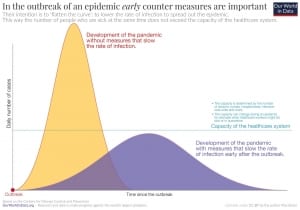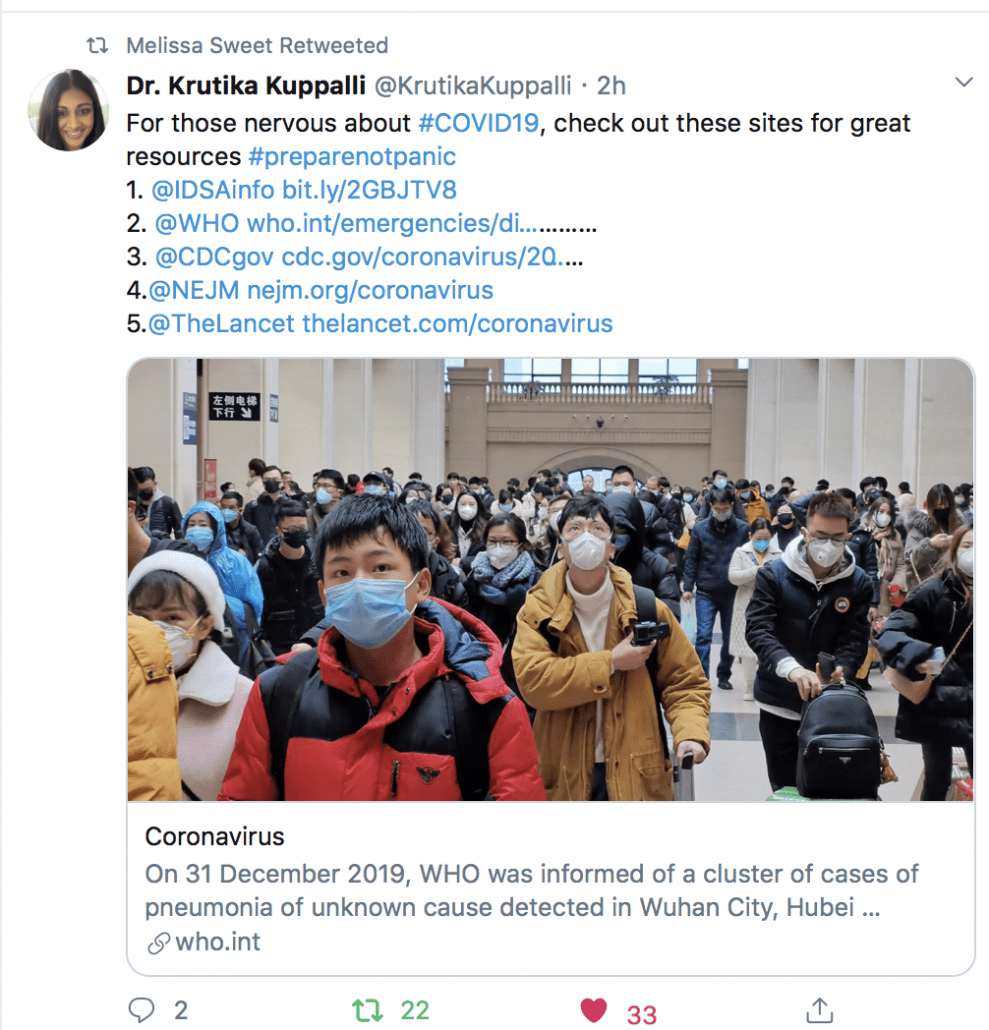For those nervous about COVID-19, check out these resources
*
Updates
By way of Canadian resources, I recommend:
1.0. Coronavirus disease (COVID-19): Awareness resources

The image courtesy of OurWorldInData.org is from a March 11, 2020 tweet from Greta Thunberg, who notes: “We can’t solve a crisis without treating it as a crisis and we must unite behind experts and science. This of course goes for all crises. Now the experts urge us to avoid big public gatherings for a better chance to #flattenthecurve and slow the spreading of the Coronavirus. 1/4”
2.0 Also of interest is material at the Ottawa Public Health website:
How to prepare for a possible pandemic situation
3.0 As well, you can check out the Toronto Public Health website:
A March 2, 2020 New York Review of Books article is entitled: “Evacuation from China, Quarantine in the UK: A Covid-19 Dispatch.”
4.0 The BMJ features an online resource entitled:
Coronavirus (covid-19): Latest news and resources
March 3, 2020 Stanford Health Policy article: Taiwan gets it right
A March 3, 2020 Stanford Health Policy article is entitled: “How Taiwan Used Big Data, Transparency and a Central Command to Protect Its People from Coronavirus.”
A related March 3, 2020 Journal of the American Medical Association Network viewpoint article is entitled: “Response to COVID-19 in Taiwan: Big Data Analytics, New Technology, and Proactive Testing.” [The site uses cookies.]
An excerpt reads:
COVID-19 occurred just before the Lunar New Year during which time millions of Chinese and Taiwanese were expected to travel for the holidays. Taiwan quickly mobilized and instituted specific approaches for case identification, containment, and resource allocation to protect the public health. Taiwan leveraged its national health insurance database and integrated it with its immigration and customs database to begin the creation of big data for analytics; it generated real-time alerts during a clinical visit based on travel history and clinical symptoms to aid case identification. It also used new technology, including QR code scanning and online reporting of travel history and health symptoms to classify travelers’ infectious risks based on flight origin and travel history in the past 14 days. Persons with low risk (no travel to level 3 alert areas) were sent a health declaration border pass via SMS (short message service) messaging to their phones for faster immigration clearance; those with higher risk (recent travel to level 3 alert areas) were quarantined at home and tracked through their mobile phone to ensure that they remained at home during the incubation period.
March 5, 2020 ProPublica article: Questions we should be asking
A March 5, 2020 ProPublica article is entitled: “I Lived Through SARS and Reported on Ebola. These Are the Questions We Should Be Asking About Coronavirus.”
The subhead reads:
For concerned civilians and journalists covering the coronavirus, the figures and projections can be overwhelming, frightening or confusing. Here’s what reporter Caroline Chen is focusing on to keep things as accurate and clear as possible.
An excerpt reads:
Over the last few weeks, many more countries have realized that the coronavirus has hit their shores. Some, like South Korea, are doing tons of testing and generating lots of data. Others, like the U.S., aren’t, as ProPublica has reported. The rate will also depend, country by country, on demographics (this virus is more deadly to the elderly) and resources (like ventilators). It’s not surprising that the global mortality rate based on confirmed cases might fluctuate for a while.
March 5, 2020 Public Health Insider article: taking care of high risk loved ones
A March 5, 2020 Public Health Insider (Seattle & King County Staff) article is entitled: “My loved ones are at high risk for contravirus. Time to make some plans.”
An excerpt reads:
There’s no doubt about it that making these kinds of changes requires sacrifice that isn’t always easy to do. It can be inconvenient, disappointing, and involve expense. So I just think of my parents, my elderly relatives and my dear friend and I have no question that it’s worth it.
This American Life Episode 695: Everyone’s a Critic – Act Two – “Mr. Chen Goes to Wuhan”
This American Life is a podcast I have read about extensively in years past.
Recently, I listened to a 23-minute podcast entitled: “Mr. Chen Goes to Wuhan.”
An excerpt from the podcast reads: “Her message is short. Chen has gone missing.”
*
[End of updates]
In a Feb. 28, 2020 tweet, Dr. Krutika Kuppalli writes:
For those nervous about #COVID19, check out these sites for great resources #preparenotpanic
1. @IDSAinfo [The site uses cookies.]
2. @WHO
https://who.int/emergencies/diseases/novel-coronavirus-2019…………
3. @CDCgov
[Given ongoing issues regarding science-based information from US government sources, I would say that the CDC may or may not be a source of pertinent data.]
4. @NEJM
5. @TheLancet
https://thelancet.com/coronavirus
*
Additional updates
A March 12, 2020 New York Times article is entitled: “How the World’s Largest Coronavirus Outbreaks Are Growing.”
An excerpt reads:
“Today, the red zone is Italy,” Matteo Renzi, a former prime minister, told The New York Times. But in 10 days, he warned, it will be Madrid, Paris and Berlin. If Italy cannot show how to stop the virus, he said, “the red zone will be Europe.”
Useful resource (New England Complex Systems Institute):
Stopping the Coronavirus Epidemic
Additional valuable resource (EndCoronavirus.org):


Leave a Reply
Want to join the discussion?Feel free to contribute!